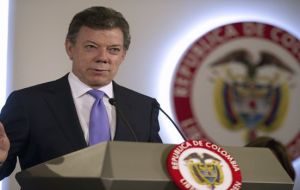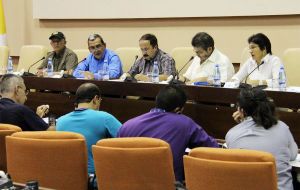MercoPress. South Atlantic News Agency
Colombia and FARC disclose copies of agreements reached at peace talks
 “We think the process is advanced enough and well protected enough to make what we have agreed public,” Santos said.
“We think the process is advanced enough and well protected enough to make what we have agreed public,” Santos said.  The talks in Cuba have produced deals on land reform, political participation for demobilized FARC fighters and the illegal-drug trade.
The talks in Cuba have produced deals on land reform, political participation for demobilized FARC fighters and the illegal-drug trade. Colombia's government and Marxist inspired FARC rebels have released copies of previously unpublished agreements reached at peace talks to end five decades of war, providing a glimpse of accords that could make up a final deal.
The nearly two-year-old talks, in Havana, Cuba, have produced deals on land reform, political participation for demobilized Revolutionary Armed Forces of Colombia, or FARC, fighters and the illegal-drug trade.
The broad points of each agreement were already public, but the full text of the accords had not been disclosed, which fueled criticism of the talks by opposition politicians who said a peace deal could mean impunity for rebel leaders.
The documents offered some details of post-conflict programs, including a land fund for poor farmers, though the amount of government financing guaranteed for such efforts remains unspecified.
Under the political participation agreement, areas that have been affected by the conflict would receive more representation in Congress, though the document does not allocate the seats to the FARC or any other group.
In other documents, the government promised to guarantee safety for political leaders, while the FARC pledged to help eradicate illegal crops such as coca.
Any final deal will have to be approved by voters in a referendum before it becomes law.
Details of the agreements had previously been kept under wraps to protect the negotiations, said President Juan Manuel Santos, who is in New York to speak to the United Nations General Assembly tomorrow.
“But now we think the process is advanced enough and well protected enough to make what we have agreed public,” Santos said.
Publishing the full agreements was also an effort to increase the transparency of the peace process, the government and the FARC said in a joint statement.
“All types of speculation about what has been agreed to persist. Speculation sometimes is the product of ignorance and other times has the intention of misinforming the public,” the government and the FARC said in a joint statement.
“For this reason, and as a transparency measure, we have decided to make public the text of the partial agreements.”
The negotiators are currently discussing victim reparations and will then move to talks on demobilization of rebel fighters. Colombia's 50-year-long conflict has killed more than 200,000 people and displaced millions.




Top Comments
Disclaimer & comment rules-

-

Read all commentsSo the talks continue!
Sep 26th, 2014 - 08:12 am 0And agreements are being reached.
And some said it would never happen.
I hope the referendum will be the perfect indicator of how Colombians feel about not giving the Farc awards for killing over 35,000 of inocents citizens instead of execute and put in motion the legal punishment system.
Sep 26th, 2014 - 03:19 pm 0For four decades, Colombia's economy has beed hardly hurt and keeping away international investment. Real touristm has been ausent for 40 years due to the Farc kidnappings actions.
Farc has intented many times to expand its ideals in several South America countries with out success, however, if they became part of the legal and democratic function and system of the Colombian goverments, will it be an indicator to other rebel groups in the region to do the same?, I mean eventually be part of the Government some day?
Kirk Nelson,
New York, USA
Commenting for this story is now closed.
If you have a Facebook account, become a fan and comment on our Facebook Page!